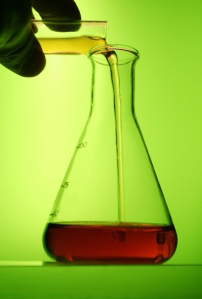This week’s post is from an interview with Cale Weatherly, a PhD student in Chemistry at the University of Wisconsin-Madison. I’ve chosen extracts that focus on the practical process of doing science and the scientist’s enjoyment of that process. My hope is that for non-scientists it will open a window on a different world, while for scientists it may provoke some thought (and comments) about their own experiences in the lab.
I’m coming to the end of my first year as a PhD student in synthetic organic chemistry. This is a branch of chemistry that’s been around for quite a long time, and chemists are pretty good at turning simple carbon-based molecules into more complex ones for pharmaceuticals and other practical applications (see comment below for more detail). There’s an enormous amount of room, however, for making the process more efficient (cheaper, less time consuming and more environmentally friendly). What we’re doing in our lab is not so much making the complex molecules ourselves but expanding the toolbox of chemical transformations that other people can use.
There’s a lot of – I use this word very deliberately – beautiful chemistry involved in turning molecule A into molecule B, and every organic chemist that I know has an aesthetic appreciation for what we do. The practical aspect of our research is important, but that’s not usually what draws people to the field or motivates us on a day-to-day basis. It’s the process that’s exciting.
Everybody brings a different kind of artistry to the process of making a molecule. Often several papers will be published describing different ways to make the same molecule, because everybody employs a unique strategy. What I like about organic chemistry is that there are different ways to approach a problem, and I often think that questions with many possible right answers are more interesting than those with only one.
The atmosphere in the lab where I work is very informal. It’s kind of messy and it’s very much our own space. I can’t imagine it being otherwise. We have to put in a lot of hours, and in the course of that time we get to know each other well. If we were formal all the time I don’t think anybody could survive long enough to accomplish any work! We work long weeks and there are days when I don’t get to do much apart from chemistry and eat. The first time you actually achieve something promising in the lab there’s a tremendous feeling of excitement. I am (if not in every little task, at least in the big picture) happy doing something that I find interesting and that will allow me to do something of service to the world in the future.
A lot of work that’s published in my field is an incremental improvement on what’s been done before, but occasionally you come across work that’s conceptually very different. Someone gets from A to B in a way you would never have anticipated. They take you through the process step by step, where each step can be shown to make good chemical sense. Those papers are always a lot of fun to read.
I think among non-scientists in general, and Christians specifically, there’s a tendency to value product rather than process. It can be difficult to explain my work to friends and family because they often want to know the practical value of what I’m doing. I’m trying to put another tool in the toolbox so that down the line somebody might be able to use it to make something useful. But it’s not the ultimate practical value of what I’m doing that I find interesting – it’s the process of getting there, and what I love about organic chemistry is thinking about the process.
The distinction between process-driven and product-driven points of view is fascinating. Of course goals are important, but anyone who has been a Christian for a while will have begun to realise that God is far more process than product minded – which is why Christian life is described as a journey. (Besides the fact that product-driven people are more likely to be unhappy perfectionists…) This is the last interview from my trip to Madison this summer, so keep your eyes peeled for some new interviews next year.





